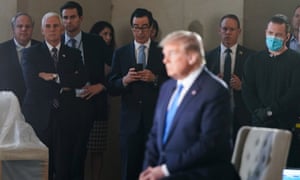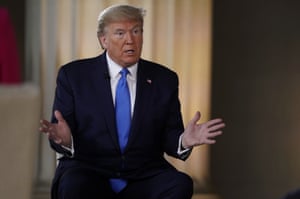With Covid-19 deaths set to almost double this month, the president is putting the stock market before lives, critics say
Donald Trump is effectively abandoning a public health strategy for the coronavirus pandemic and showing “clear willingness to trade lives for the Dow Jones”, critics say.
A leaked internal White House report predicts the daily death toll from the virus will reach about 3,000 on 1 June, almost double the current tally of about 1,750, the New York Times revealed on Monday.Yet at the same time, Trump has scrapped daily coronavirus task force briefings and marginalized his medical experts in favour of economic officials flooding the airwaves to urge states to reopen for business – even amid rising infection rates.
On Tuesday morning, before boarding Air Force One to visit a medical mask-making facility in Arizona for his first long trip since late March when the outbreak escalated in the US, Trump weighed a predicted surge in deaths against economic revival.
“There is no great win, one way or the other, but I will tell you where there is a win, we are going to build a country, I did it once, two months ago we had the best economy in the history of the world, but we are going to do it again and that’s what we’re starting … it’s going to happen pretty fast.”
“How many deaths and how much suffering are you willing to accept to get back to what you want to be some form of normality sooner rather than later?” he asked.
And on Tuesday morning New York governor Andrew Cuomo warned against what he called a life or death “trade-off” when planning how and when to lift restrictions.
“The faster we reopen the lower the economic costs, but the higher the human costs because the more lives lost. That, my friends, is the decision we are really making,” Cuomo said at his daily briefing.
Critics are now sharply questioning the Trump administration approach to what Fauci called “a very difficult choice” that weighs a death toll against economic catastrophe.
“They’ve decided in a very utilitarian kind of way that the political damage from a collapsed economy is greater than the political damage from losing as many as 90,000 more Americans just in June,” said Rick Wilson, a former Republican strategist. “We’re witnessing the full-scale application of a kind of grisly realpolitik that is a clear willingness to trade lives for the Dow Jones.”
When Trump declared a national emergency on 13 March, hopes rose that, for all the early downplaying and missed testing opportunities, the federal government was finally ready to attack the crisis with full force.
Trump quickly branded himself a “wartime president” and, on 31 March, somberly braced Americans for a “very, very painful two weeks” ahead. His daily White House coronavirus taskforce briefings earned comparisons with campaign rallies, sometimes running for more than two hours, but also featured respected experts, Deborah Birx and Anthony Fauci, armed with graphics and science.
On 23 April, however, Trump pontificated about injecting disinfectant into coronavirus patients, prompting worldwide disbelief and derision. The briefings would never be the same again and over the past week have been replaced by set-piece events touting an economic comeback.
On Sunday, tellingly, when Trump held a Fox News virtual town hall entitled “America Together: Returning to Work” at the Lincoln Memorial in Washington, he was accompanied not by Birx and Fauci but Vice-President Mike Pence and the treasury secretary, Steven Mnuchin.
The president has been egged on by Fox News hosts who question whether the virus is any worse than the common flu, doubt the value of physical distancing and contend that the economic shutdown, which has cost at least 30m jobs, shows the cure is worse than the problem.
On Saturday, a Washington Post report suggested Trump had been encouraged to pivot from the health crisis to the economic fightback by an internal White House analysis that suggested the daily death toll would peak in mid-April then fall away significantly. His “decision-making has been guided largely by his re-election prospects”, the Post added.
But death toll predictions from the University of Washington’s Institute for Health Metrics and Evaluation, a model favored by the White House, were raised on Monday from 72,000 to 134,000 by the start of August because, it said, states are relaxing physical distancing too soon.
Now, critics say, Trump seems ready to shrug at the losses as collateral damage, paying greater heed to his campaign manager, Brad Parscale, than Birx or Fauci.

Joe Lockhart, a former White House press secretary, said: “Almost by necessity, they are changing their strategy. They are pinning all of their hopes on getting the economy reopened, using their economic spokespeople and hoping that the American public has a high toleration for the death count moving up. It sounds terrible to say and even worse to do.
“I think you won’t be seeing much from the scientists any more – the news is that bad – and they’re just going to turn a blind eye to the fact that what they’re doing is going to kill more people, because ultimately the way the president makes decisions is what’s good for his re-election.”

No comments:
Post a Comment